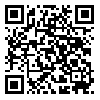Volume 10, Issue 1 (2019)
LRR 2019, 10(1): 25-50 |
Back to browse issues page
Download citation:
BibTeX | RIS | EndNote | Medlars | ProCite | Reference Manager | RefWorks
Send citation to:



BibTeX | RIS | EndNote | Medlars | ProCite | Reference Manager | RefWorks
Send citation to:
fallah E, shafipor S. Analyzing Moses and Samiri’s Narrative – A Semiotic Approach. LRR 2019; 10 (1) :25-50
URL: http://lrr.modares.ac.ir/article-14-19134-en.html
URL: http://lrr.modares.ac.ir/article-14-19134-en.html
1- Assistant professor of Islamic Azad university of Sari branch , fallahabrahim@gmail.com
2- Ph.D. Candidate in Comparative Commentary – University of Science and Teaching of Quran – Qom-Iran
2- Ph.D. Candidate in Comparative Commentary – University of Science and Teaching of Quran – Qom-Iran
Abstract: (9349 Views)
In the framework of Greimas semiotic theory and the notions like actantial model, axiological system and deep structure-meaning, the current research tries to analyze Moses and Samiri’s narrative. By adopting a descriptive –analytical approach, this study seeks to investigate the underlying structure of this narrative in order to explore the dominant discursive systems. This approach help better understand the discursive system of Quran. The results showed that the core element of this narrative is based on action and state which proves the guidance discourse and negates the idolatry discourse. Moreover, the analyzes showed that the process of attaching people to an object of value is initially formed with a prescriptive discourse, then this prescriptive discourse leads to the formation of state in actor and ultimately to the competence and people's attachment to the guidance discourse. Thus, in the stative system, the decadence of meaning begins in actor which then changes into action and discontinuity from object of value. According to dominant discursive systems, this meaning generation process acts in two paradoxical way.
Send email to the article author
| Rights and permissions | |
 |
This work is licensed under a Creative Commons Attribution-NonCommercial 4.0 International License. |







